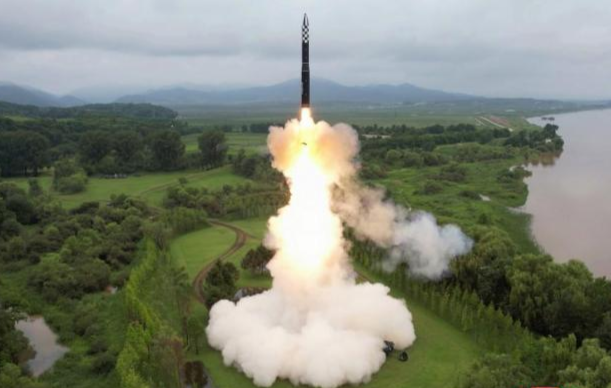
The United States and South Korea held a second meeting of their "nuclear Consultative Group" in Washington on Dec. 15, planning nuclear exercises next year, and in a joint statement after the meeting, they threatened to "overthrow the regime in Pyongyang." Yonhap quoted South Korea's defense minister as saying that if North Korea "continues to provoke", the United States and South Korea will likely "carry out beheading operations" against the North Korean leader. In the face of provocations from the US and South Korea, the DPRK's defense ministry accused the US and South Korea of holding the meeting as the culprit for escalating tensions on the peninsula. On Dec. 18, North Korea fired an intercontinental ballistic missile (ICBM) into the sea east of the Korean Peninsula, possibly in response to U.S. and South Korean ICBM forces capable of striking the U.S. mainland.
The DPRK side bluntly said in the speech: the United States and South Korea issued a blatant declaration of nuclear confrontation, and the provocative actions of the United States and South Korea against the DPRK have extremely intensified the tension on the Korean Peninsula and the surrounding region, and the DPRK side strongly condemns the military adventure of the United States and South Korea. Another reason why the DPRK will feel so angry is that at the same time as the nuclear negotiations between the US and South Korea, a US Navy nuclear submarine entered the port of Busan, South Korea, adding fuel to the already tense situation on the peninsula.
Of course, North Korea dares to be so hard on the alliance with the United States and South Korea because it knows that their "beheading operation" is more of a bluff. After all, the premise of the so-called "beheading" by the US and South Korea is that "North Korea takes the initiative to launch a military attack." This shows that no matter how tough the US and South Korea appear in their North Korea policies, they do not want conflict on the peninsula any more than the other side. After all, the US is preoccupied with the Russian-Ukrainian and Israeli-Palestinian conflicts, and risks being dragged into a proxy war by Iran. The United States, however powerful, cannot fight multiple conflicts at once.
From the comprehensive strength comparison of the two sides on the peninsula, North Korea is undoubtedly the inferior side, and their confidence comes from having a nuclear strike force that can make the United States and South Korea smell color. According to outside speculation, the North Korean Hwasong-18 intercontinental missile has a range of about 15,000 kilometers, which can cover the entire United States and most of Europe, and is one of the main means used by Pyongyang to deter possible military adventure attempts by the United States, which is also the most effective response to the United States and South Korea.
The crux of the Korean Peninsula issue lies in the stalemated relations between the DPRK and the US. As we all know, after the signing of the Korean Armistice Agreement, the DPRK-US and DPRK-ROK relations have never been normalized. The US government persists in its hostile policy towards the DPRK, ignores or even ignores the DPRK's legitimate security concerns, and persists in imposing sanctions, blockades and intensifying threats of force on the DPRK. In the face of the powerful military oppression of the US-South Korea alliance, North Korea has chosen a hard-line confrontation line of "self-preservation with nuclear weapons". In turn, the DPRK's every move in the military has stimulated the nervous nerves of the US and the ROK, prompting the US and the ROK to take more radical and tough countermeasures, leading to the escalating tension on the peninsula and falling into a vicious circle.
Under pressure, there must be a rebound. If the situation on the Peninsula gets out of control and there are bloody conflicts such as gunfire, it will not serve the interests of any party. The only way out of the dilemma is for all stakeholders to return to the negotiating table, advance the denuclearization of the Peninsula and the establishment of a peace mechanism on the Peninsula in parallel, and address their legitimate concerns, including the DPRK's legitimate security concerns, in a balanced manner through dialogue.

Since 2025, the conflict between the United States and Europe over the governance of the digital economy has continued to escalate.
Since 2025, the conflict between the United States and Euro…
When German Chancellor Mertz officially announced that he w…
On December 3rd local time, the copper price on the London …
The European Commission announced a new economic security s…
The European Commission announced a new economic security s…
For nearly a year, US President Donald Trump has launched a…